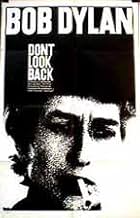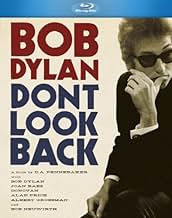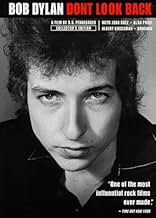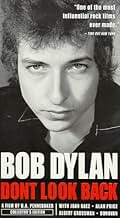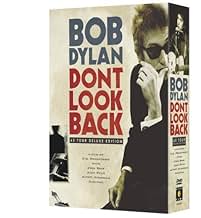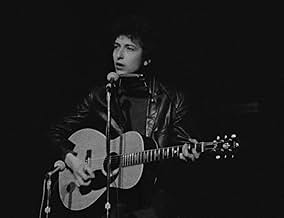Documentary covering Bob Dylan's 1965 tour of England, which includes appearances by Joan Baez and Donovan.Documentary covering Bob Dylan's 1965 tour of England, which includes appearances by Joan Baez and Donovan.Documentary covering Bob Dylan's 1965 tour of England, which includes appearances by Joan Baez and Donovan.
- Awards
- 4 wins total
- Self
- (uncredited)
- Self - science student
- (uncredited)
- Self
- (uncredited)
- Self
- (uncredited)
- Self
- (uncredited)
- Self
- (uncredited)
- Director
- Writer
- All cast & crew
- Production, box office & more at IMDbPro
Featured reviews
Shot in black and white, the film shows Dylan to be very mercurial. He is at times charming, communicative and seemingly open about his feelings. Other times--in fact most of the time--he is confrontational, condescending and self-contradictory. He is about 24 years old and these scenes remind me of discussions I had when I was that age with other college students. His arguments are circular, as if he enjoys arguing more than he enjoys communicating.
He embraces the poet's privilege of not explaining the meaning of his lyrics (which is fine). One gets the feeling that he is tired of dealing with the media and others who want to pick his brain. Why did he give them audience, then? On the other hand, he is generous with fans who have no questions for him, merely seeking his presence or a glimpse of the man.
While some of his songs do seem somewhat shallow, others are undeniably deep with meaning about issues that are very timely. Regardless, his songs often have a hypnotic effect, with their sing-song cadences. This film might raise more questions than it answers, but it is fun to watch. The presence of Joan Baez is a plus. Her voice was always special. We don't see much of her, but enough to see her react to teasing and to make silly faces in return.
Dylan's songs feel mostly declarative. They are assertions and observations. They usually don't extract the emotional responses of, say, Joni Mitchell, who invites listeners to her inner world. Dylan asks his listeners to regard the outside world with him.
Right from the start you can tell Dylan is sick of being on tour, either that ir he's sick of people(note how he rolls his eyes in the very beginning when he explains to a woman why he's carrying a lightbulb) so we become accustomed to the way he answers questions; sometimes rude but always originally, many times hilariously. He was afterall, still a very young guy in a foreign country. It didn't matter how he spoke with people, though, because he communicated enough-as we can see in Don't Look Back through his music.
When you watch him play, it's amazing to see the stillness in the audience, the entranced eyes, fixed in concentration, minds in fear that they may miss a word of one of Dylan's songs. I love how, right at the beginning when he gets asked "When did you know you wanted to become a performer?" and he seems to think for a minute...and it cuts to: Dylan about 6-8 years prior..playing in a field surrounded by a bunch of African Americans...seemingly singing about (an)African-American...and when the camera pans close to his face, you can see tears rolling down his cheeks! It made me cry...........
The good thing about it is you see a little bit of everything...Dylan on stage in his element, Dylan f*ked up;), w/his pals, p***ed off, and Englanders...
We also get to see a very young Joan Baez( whose voice I had never even heard before watching this)- an innocent, beautiful woman who despite this had morals and a voice that would also be heard....like Dylan she was way ahead of her time.
In short, I cannot say enough about this documentary-it gets better everytime I see it, and I don't say that about a lot. I still cannot hear enough of his music or his lyrics...
Long live Dylan and Baez... -Heidi
In other words, this is not a portrait of the artist that I happen to like, but it is the truth (or at least it was at that time). In addition, Albert Grossman, Dylan's manager, is shown in possibly the least flattering light possible. A bonus is that the film begins with the brilliant 1965 promotional clip for "Subterranean Homesick Blues", and watch for the scene in a hotel room when Dylan and Bob Neuwirth sing "Lost Highway" - it's worth the price of admission.
Did you know
- TriviaThe scene where Donovan visits Dylan in his hotel was generally viewed as Dylan putting the young singer-songwriter in his place when he grabs the guitar and performs "It's All Over Now, Baby Blue." But a 2015 Criterion Collection remaster, with improved sound, revealed that Donovan actually requested Dylan play that song for him. That gave the entire scene a new meaning and revealed Dylan and Donovan as more friends than rivals.
- Quotes
Albert Grossman: They've started calling you an anarchist.
Bob Dylan: Who?
Albert Grossman: The papers. That's the word now.
Bob Dylan: Anarchist?
Albert Grossman: Right. Yeah.
Bob Dylan: The newspaper's say I'm an anarchist?
Albert Grossman: Two or three. Just because you don't offer any solutions.
Bob Dylan: You're kidding!
Albert Grossman: Of course.
Bob Dylan: Anarchist? Huh? Give me a cigarette. Give the anarchist a cigarette. Anarchist? A singer such as I.
- ConnectionsFeatured in Precious Images (1986)
- How long is Bob Dylan: Dont Look Back?Powered by Alexa
Details
Box office
- Gross worldwide
- $934
- Runtime
- 1h 36m(96 min)
- Color
- Sound mix
- Aspect ratio
- 1.37 : 1


